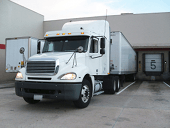Hauling Vans
November 28, 2014
When driving trucks, vans comprise the largest number of trailers. Most freight that is carried on trailers is not temperature sensitive, thus vans can be loaded with anything from dog food to carpet.

After being backed into a loading dock, most freight is placed on pallets and loaded on the trailer with a fork truck. Some loading docks are well planned, with plenty of space, clear line markings, and signal lights. Other loading docks are somewhat of an afterthought and prove challenging to back into – even to the point where the driver is backing in on the blind side.
Despite the fact that vans are often loaded with a fork truck, loading can often take several hours, especially if the load is comprised of LTL (less-then-load) freight. If the tractor has a bunk, the driver can sleep during this time. As with many loads however, the shipper requires that the driver act as an agent for the freight company and count all freight that is loaded onto the truck. Before signing the Bill of Lading, the driver must do a count of the freight on her truck.
Some freight, like office furniture, is unloaded at the job site. A crew that unloads and unwraps the freight meets the driver, and this can take several hours. If any wrapping blankets have been used to protect the product, the driver is usually responsible for the folding of these.
Pros
Unless you’re working for a moving company, most of the freight loaded on a van is hands free. Your job is to drive the truck, not work as a lumper . Those drivers hauling flat deck or refrigerated trailers require additional skills that require more time and energy on the part of the driver (see flatdeck and refrigerated trailers) And if you’re working for a long haul company, many of the loads are pre loaded, thus saving you time owing to the fact that your hauls are pin-to-pin. For many long haul companies, you are paid piecemeal, meaning that you get paid by the mile; therefore, if the ‘wheels aren’t turning’, you aren’t getting paid. Yet, owing to the driver shortage that many companies have recently experience, trucking companies have begun to pay an hourly wage to drivers, often for delays longer than two hours, such as unloading, border crossings, or during breakdowns.
Cons
Operating van trailers—relatively speaking—have few cons. Some companies ship LTL , which means that the driver is required to make numerous stops and pick-ups. If a driver is somewhat new to the position, navigating, locating and backing into numerous loading docks can be a challenging task indeed.
By Benchill (Own work) [CC-BY-SA-3.0 or GFDL], via Wikimedia Commons





